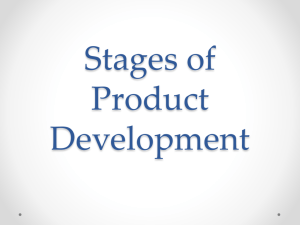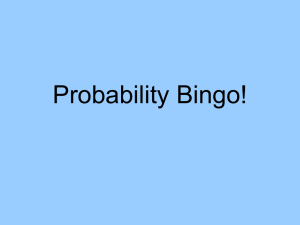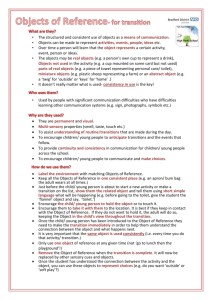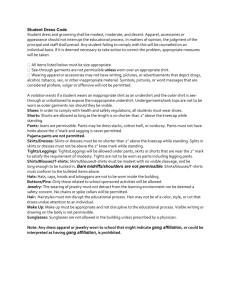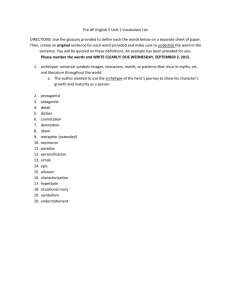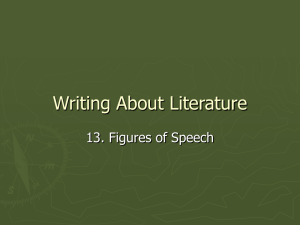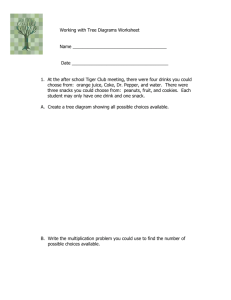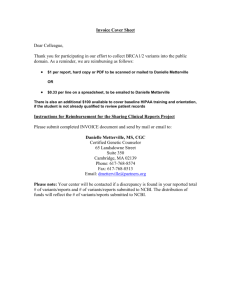Harry Potter Dictionary When the Harry Potter books were edited for
advertisement
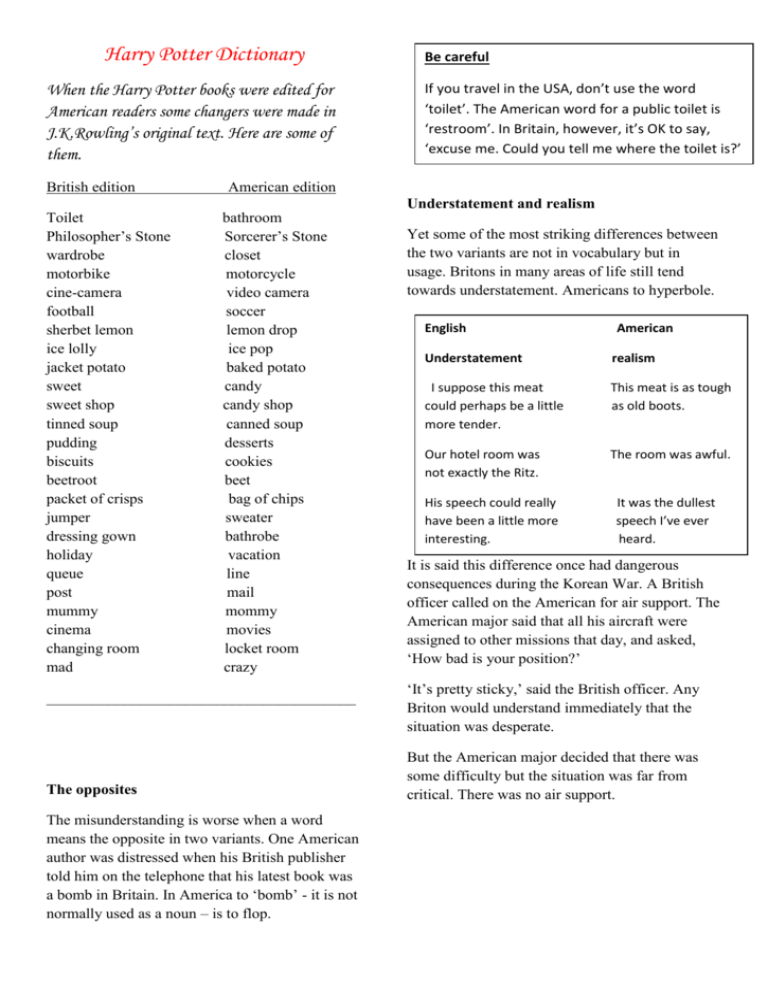
Harry Potter Dictionary When the Harry Potter books were edited for American readers some changers were made in J.K.Rowling’s original text. Here are some of them. British edition Be careful If you travel in the USA, don’t use the word ‘toilet’. The American word for a public toilet is ‘restroom’. In Britain, however, it’s OK to say, ‘excuse me. Could you tell me where the toilet is?’ American edition Understatement and realism Toilet Philosopher’s Stone wardrobe motorbike cine-camera football sherbet lemon ice lolly jacket potato sweet sweet shop tinned soup pudding biscuits beetroot packet of crisps jumper dressing gown holiday queue post mummy cinema changing room mad bathroom Sorcerer’s Stone closet motorcycle video camera soccer lemon drop ice pop baked potato candy candy shop canned soup desserts cookies beet bag of chips sweater bathrobe vacation line mail mommy movies locket room crazy ________________________________________ The opposites The misunderstanding is worse when a word means the opposite in two variants. One American author was distressed when his British publisher told him on the telephone that his latest book was a bomb in Britain. In America to ‘bomb’ - it is not normally used as a noun – is to flop. Yet some of the most striking differences between the two variants are not in vocabulary but in usage. Britons in many areas of life still tend towards understatement. Americans to hyperbole. English American Understatement realism I suppose this meat could perhaps be a little more tender. This meat is as tough as old boots. Our hotel room was not exactly the Ritz. The room was awful. His speech could really have been a little more interesting. It was the dullest speech I’ve ever heard. It is said this difference once had dangerous consequences during the Korean War. A British officer called on the American for air support. The American major said that all his aircraft were assigned to other missions that day, and asked, ‘How bad is your position?’ ‘It’s pretty sticky,’ said the British officer. Any Briton would understand immediately that the situation was desperate. But the American major decided that there was some difficulty but the situation was far from critical. There was no air support. American English VS British English ‘It was decided almost two hundred years ago that English should be the language spoken in the United States. It is not known, however, why this decision has been carried out.’ George Mikes ‘We are two countries separated by a common language.’ G. B. Show English in America For 150 years America was a British colony. At that time British and American English were almost exactly the same. When America won the War of Independence in 1776, it became a free country. In 1782, its citizens were proudly christened ‘Americans’, and in 1802, US leaders began to talk about ‘the American language’. The USA was quickly richer and more powerful. Millions of Europeans came to America to start a new life there. There were settles from Italy, Germany, Spain, Ireland, France and other countries and all of them brought new words and expressions to the language. The USA became a ‘melting pot’ of cultures. As a result, America began to develop a character of its own and today, there are certain differences in pronunciation, grammar, vocabulary and spelling between American and British English. Different sounds First of all, British and American English sound differently. Often, Americans don’t say each word separately. They say several words together. Americans may say ‘I dunno’ instead of ‘I don’t know.’ Or they may say ‘Whaddya say?’ instead of ‘What did you say?’ The British are more careful in their speech. Also, some letters have different sounds. For example, pronounce the ‘a’ in half, past, and last as [æ]. How to speak New Yorkese In New York City, many people have a way of speaking English that is called New Yorkese. Speakers of New Yorkese often speak very fast. Unlike other Americans, they tend not to pronounce the ‘r’ in words that end in ‘er’. But they do pronounce the ‘r’ in the wrong words. They add the letter at the end of words such as ‘idear’ (idea) and ‘sofer’ (sofa). If you are a movie fanatic, you may have head New Yorkese from Robert De Niro or Woody Allen. My English has gotten better There are some grammatical differences between British and American variants. In British English, the past participle of ‘get’ is ‘gotten’. American English accept the use of the Simple Past tense where British English requires Present Perfect: Did you see him yet? He just went out. Did you go there already? Different prepositions There are a number of interesting AngloAmerican differences in the use of certain prepositions. The British talk to their friends, the Americans talk with them. The British look out of the window, throw something out of the window, and even fall out of the window. Americans simply look out of the window. Americans check out the situation, while the British check up on it. If the British do not go out, they stay at home. Americans stay home. Citizens of the UK sit down to write to their friends. Holders of the US passports simply write their friends. Verbal misunderstanding Some American words are simply unknown on the other side of the Atlantic, and vice versa. But a lot of words exist in both variants, and these can cause trouble. In his book ‘How to Scrape Skies’ George Mikes gives several examples of this verbal misunderstanding: ‘You must be extremely careful concerning the names of certain articles. If you ask for suspenders in a man’s shop, you receive a pair of braces, if you ask for a pair of pants, you receive a pair of trousers and should you ask for a pair of braces, you receive a queer look.’ British visitors to America are often surprised at the different meanings that familiar words have acquired there. If an Englishman asks in an American store for a vest, he will be offered a waistcoat. If he wants to buy a handbag for his wife, he should ask for a purse, and if she wants to buy a pair of tights, she should ask for pantyhose: tights in America are what ballet dancers wear. What shall we wear? British American Trousers pants Pants underwear Jumper sweater Trainers sneakers Dressing gown bathrobe Tights pantyhose Purse - кошелек (брит.), дам. Сумочка (амер.) Extremely – очень, чрезвычайно Tights – колготки (брит.) Concerning – относительно, касательно Pantyhose – колготки (амер.) Article – предмет, вещь, изделие Distressed – огорченный, пораженный Suspenders – подвязки (бр.), подтяжки (ам.) Bomb – сенсация (бр.), неудача, провал (ам.) Braces – фигурные скобки, подтяжки (бр.) To flop – потерпеть неудачу (амер.) Pants – трусы (бр.), брюки (ам.) Understatement - недоговоренность Queer – странный, подозрительный Striking - поразительный To acquire - приобретать To tend towards – быть склонным к Vest – майка (бр.), жилет (ам.) Hyperbole – преувеличение, гипербола Waitcoat – жилет (бр) Consequences - последствия Air support – поддержка с воздуха Major - майор His aircraft were assigned to other mission – его самолеты отправлены на выполнение других заданий Sticky – сложный, очень неприятный Desperate - безнадежный Was far from critical – была далеко не критической Vs (versus) - против To carry out – выполнять, осуществлять To christen – давать имя, называть Settler - поселенец Melting pot – «плавильный котел» (место смешения рас и народов) To develop – проявлять, обнаруживать Verbal misunderstanding – недоразумение, вызванное неправильным пониманием слова Vice versa - наоборот To cause trouble – причинять беспокойство To scrape – скрести, царапать
